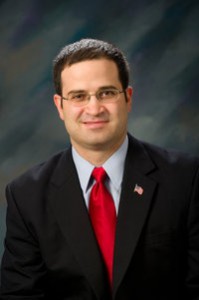Although Edward Ra is the Republican incumbent in the race for the 19th State Assembly District seat, he said he doesn’t really feel like an incumbent.
When he successfully ran in his first campaign for the Assembly two years ago, he went to Albany representing the 21st State Assembly District which included Elmont and Franklin Square, where Ra lives.
But with this year’s shift in assembly districts, Ra finds 80 percent of his territory changed. So he’s running for re-election in what was largely the 17th State Assembly District that is – until January – the district that has been represented by Republican Thomas McKevitt.
So it’s a whole new ballgame for Ra, running in the 19th district that includes a wide geographic spread of New Hyde Park, Mineola, the Willistons, Carle Place, Old Westbury, Glen Head.
“It’s like running for the first time,” Ra said in a recent interview with Blank Slate Media.
Ra is also running on the Conservative, Independence and Tax Revolt Party lines.
The district may be different, but the essential issues of primary concern to Ra haven’t changed.
“The main issue to me is the economy and jobs,” Ra said. “We have gotten things on the right track but now it’s a matter of continuing that. We’ve set a table on things, but pro-growth job efforts is the main focus.”
Ra said he sees a need for the Legislature to take a pro-active tact for businesses in the state, with a relaxation of tax assessments against business. Ra cites the possible end of the MTA Tax, declared unconstitutional in a state Supreme Court ruling earlier this year, as an important step in the right direction.
“We do have to enact pro-business legislation or at the very least adopt a do-no-harm philosophy,” Ra said. “We need to not keep pushing assessments on businesses.”
He cites mandate relief as a primary means of correcting financial imbalance in the state – starting with Medicaid. And he said the state’s assumption of county increases in Medicaid increases as a key part of redressing that excesses of that annual $50 million mandate.
“Addressing the mandates will allow schools and villages allocate better the money they’re getting rather than being handcuffed,” Ra said.
The state Mandate Relief Task Forces have made sound recommendations, including one enacted in to law extending the time for villages and school districts to continue using lever voting machines, Ra said. That represents a significant savings by relieving them of leasing expensive paper ballots with computers tallying votes.
Ra said the combined impact of federal and state mandates double the pressure on school districts.
“Streamlining of that may help some of that. The problem you run into is that both the administrators and teachers say they want mandate relief but it means something different to each of them,” Ra said.
Ra said he expects the state Legislature to move toward “smoothing” employer contributions to pension funds, although he concedes it will never be eliminated.
“It would never go to zero again but hopefully it would never come back,” he said.
As things stand now, he said, the only control villages or school board can exercise is to cut their budgets.
He said sharing services between the 56 school districts in Nassau County is one way for them to economize.
Ra also noted that legislation Gov. Andrew Cuomo spearheaded on governmental consolidation makes it easier to dissolve municipalities. But he sees a need to amend the law, which permits a vote for disbanding a municipality before defining an alternative to it.
“I think there are places where it can be done,” he said. “The way the law is written now, you don’t really get to see what you’re getting.”
Ra thinks the key to continuing progress in repairing the state’s finances lies in bipartisan collaboration. And he praises Cuomo’s “strong efforts” to work with the Legislature.
“You have to able to work on a bipartisan basis, which you have to do to get something done anyway,” Ra said. “I think we have a lot of good ideas as do people on the other side of the aisle.”
Ra said he has worked with state Assembly Democrats on several ideas, including a bill to authorize a property tax break on newly constructed houses intended to stem the tide of young professionals leaving Long Island that hasn’t been enacted.
“I felt here in Nassau County and western Long Island, we don’t’ have a ton of new construction going on,” Ra said.
Ra is opposed by Gary Port, a lawyer who unsuccessfully challenged Town of Hempstead Supervisor Kate Murray last year.
Addressing his opponent’s positions, Ra said Port’s focus isn’t on statewide issues, but rather on issues he addressed during his unsuccessful campaign for Town of Hempstead supervisor last year.
“My focus is on state government,” he said.
On hydraulic fracturing, Ra said the state Department of Environmental Conservation should have the final word on the practice.
“I would hope that decision is one made on the basis of good science, on what can be done safely I support regulating very strongly. But if there are areas where it can be done safely, they should be allowed to do it,” Ra said.
Prior to running for the Assembly seat he currently holds, Ra spent several years working as deputy town attorney for the Town of Hempstead, where his father, Joseph, serves as town attorney. Prior to that he was a legal aide in the state attorney general’s office.
Ra currently works as a land use and zoning attorney with Forchelli, Curto, Deegan, Schwartz, Mineo & Terrana in Uniondale. But his state Assembly duties dominate his time when the Legislature is in session.
“While we’re in session, it’s at least a full-time job if not two full-time jobs,” he said.



